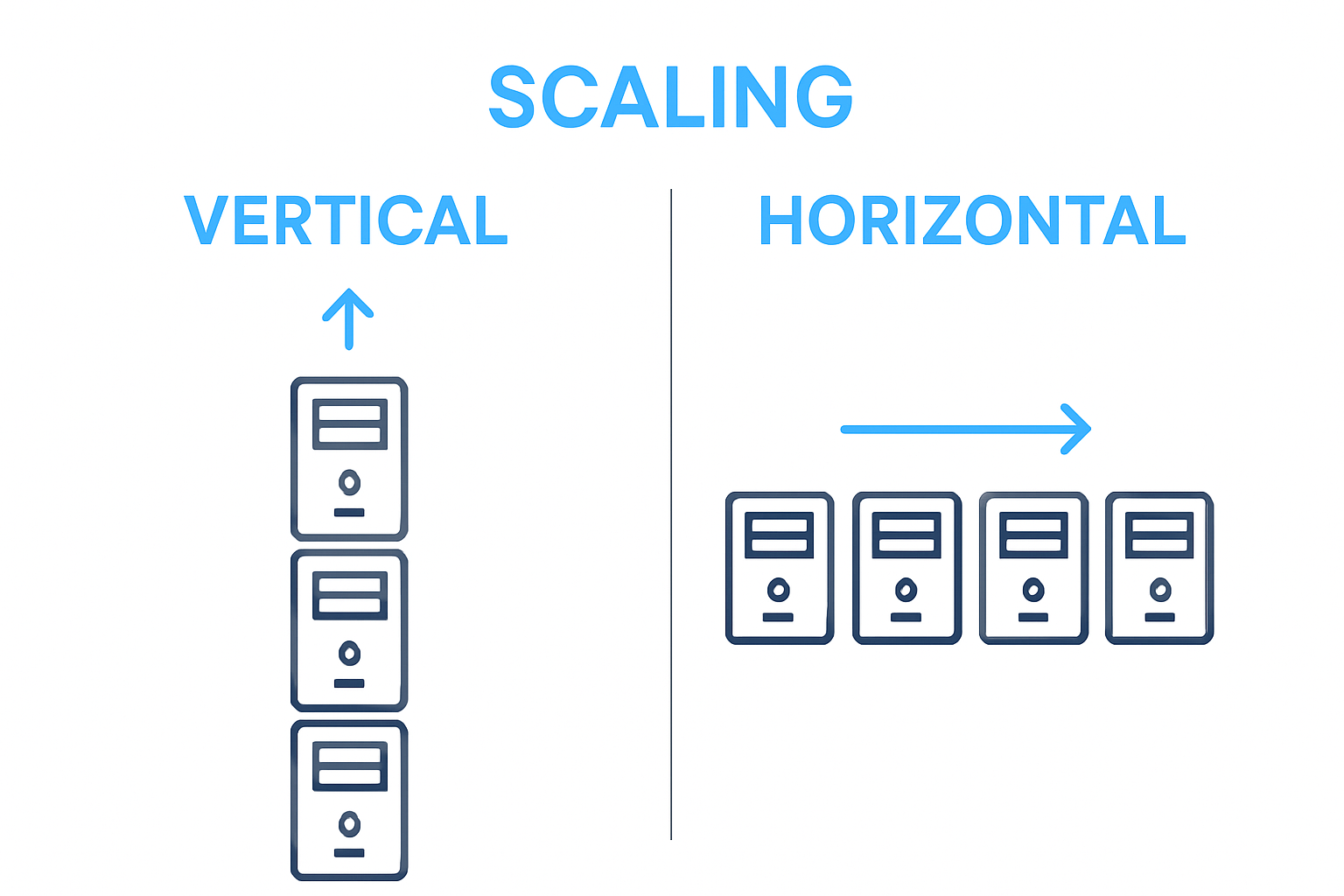South African companies are searching for smarter ways to keep up with unpredictable growth and changing technology. Most assume that adding more software just complicates things and drains budgets. But research shows that scalable software can help businesses manage up to 10 times more data without any dip in performance or a full system overhaul. That flips the whole story—because instead of technology holding you back, it becomes the advantage you never saw coming.
Table of Contents
- What Are Scalable Software Solutions?
- Why Scalable Software Solutions Matter for Businesses
- How Scalable Software Solutions Function
- Key Concepts Behind Scalable Software Solutions
- Real-World Applications of Scalable Software Solutions
Quick Summary
| Takeaway | Explanation |
|---|---|
| Scalable solutions grow with business needs | These software systems adapt to increasing workloads, ensuring consistent performance during growth. |
| Tech flexibility reduces costs and risks | Businesses optimize resources without large upfront investments, minimizing the risk of obsolescence. |
| Modular design enhances adaptability | Independent components allow for easier upgrades and modifications, supporting dynamic changes in technology. |
| Competitive advantage through responsiveness | Scalable solutions enable rapid adaptation to market changes, fostering innovation and operational efficiency. |
| Real-world applications span industries | From healthcare to e-commerce, scalable software addresses specific operational challenges across various sectors. |
What are Scalable Software Solutions?
Scalable software solutions represent sophisticated technological frameworks designed to dynamically adapt and grow alongside a business’s evolving computational demands. These solutions provide flexible, efficient systems that can seamlessly expand or contract based on organisational requirements without compromising performance or stability.
Understanding Core Scalability Characteristics
At their essence, scalable software solutions possess several fundamental attributes that distinguish them from traditional static software architectures. Scalability fundamentally means the ability of a system to handle increasing workloads smoothly and efficiently. This means as your business grows, your software can accommodate more users, process larger volumes of data, and maintain consistent performance levels.
Key characteristics of scalable software solutions include:
- Ability to manage increased processing requirements without significant infrastructure redesign
- Flexible architecture that supports modular growth and technological adaptation
- Performance consistency across different operational scales
- Cost-effective expansion mechanisms
Strategic Business Implications
For South African businesses navigating complex digital transformation landscapes, scalable software solutions offer strategic advantages. These solutions provide computational flexibility that allows organisations to respond quickly to market changes, technological shifts, and internal growth trajectories.
By implementing scalable software solutions, businesses can address their unique technological challenges without massive recurring investments. According to the U.S. Economic Development Administration’s Build to Scale program, such technological adaptability is crucial for entrepreneurial ecosystems aiming to bring innovative products and services to market efficiently.
The core philosophy behind scalable software solutions is not merely about technology, but about creating intelligent, responsive digital infrastructures that evolve in synchronisation with organisational ambitions. By prioritising scalability, businesses transform technological constraints into strategic opportunities for growth and innovation.
Why Scalable Software Solutions Matter for Businesses
In the rapidly evolving digital economy, scalable software solutions have transformed from optional technological investments to critical business survival mechanisms. These solutions represent more than mere technological upgrades - they are strategic frameworks that enable organisations to remain competitive, responsive, and efficient in increasingly complex market environments.
Economic and Operational Benefits
Scalable software solutions deliver profound economic advantages by enabling businesses to optimise resource allocation and manage technological infrastructure dynamically. Instead of making massive upfront investments in rigid systems, companies can now deploy flexible solutions that grow proportionally with their operational requirements.
Key economic benefits include:
- Reduced initial capital expenditure on technological infrastructure
- Minimised risk of technological obsolescence
- Enhanced ability to experiment with new business models
- Improved return on technological investments
Competitive Advantage in Digital Transformation
Businesses that understand how custom software addresses their unique needs gain significant competitive advantages. According to research published in the IEEE digital library, scalable architectures are fundamental to modern digital business models, directly impacting operational efficiency and customer satisfaction.
The true power of scalable software solutions lies in their ability to transform technological constraints into strategic opportunities. By creating adaptable digital infrastructures, businesses can:
- Rapidly respond to market changes
- Support unexpected growth scenarios
- Maintain consistent performance under varying computational demands
- Integrate emerging technologies seamlessly
In essence, scalable software solutions are not just technological tools, but strategic assets that enable businesses to navigate complex digital landscapes with agility, efficiency, and resilience. They represent a forward-thinking approach to technological investment, where adaptability becomes a core competitive advantage.
How Scalable Software Solutions Function
Scalable software solutions operate through sophisticated technological architectures that enable dynamic resource allocation, performance optimization, and seamless system expansion. These solutions leverage advanced computational strategies to ensure businesses can efficiently manage increasing computational demands without compromising system stability or performance.
Architectural Principles of Scalability
Scalable software solutions fundamentally rely on two primary scaling approaches: vertical and horizontal scaling. Vertical scaling involves increasing the computational power of existing infrastructure, while horizontal scaling distributes workloads across multiple systems, creating a more robust and flexible technological ecosystem.
Below is a table comparing vertical and horizontal scaling approaches, helping to clarify their core differences within scalable software architecture.
| Scaling Approach | Description | Key Benefits |
|---|---|---|
| Vertical Scaling | Increases computational power of existing infrastructure | Simple upgrade path, minimal system change |
| Horizontal Scaling | Distributes workloads across multiple systems | Enhanced resilience, flexible expansion |

Key architectural principles include:
- Modular design that allows independent component upgrades
- Distributed computing frameworks
- Efficient resource management mechanisms
- Automated load balancing capabilities
Technical Mechanisms of Scalable Systems
The technical infrastructure of scalable software solutions involves complex but strategic computational techniques. Learn more about the benefits of building custom software that can adapt to your specific organizational needs. According to research from Google Cloud, scalable systems employ sophisticated resource allocation strategies that dynamically adjust computational resources based on real-time demand.
These systems typically incorporate:
- Microservices architecture enabling independent service scaling
- Cloud-native technologies that support elastic infrastructure
- Containerization for lightweight, portable computational units
- Advanced caching mechanisms to reduce processing overhead
The core strength of scalable software solutions lies in their ability to transform rigid technological infrastructures into fluid, responsive systems. By implementing intelligent design principles and leveraging modern computational frameworks, these solutions provide businesses with the technological flexibility required to navigate complex and rapidly evolving digital landscapes.
Key Concepts Behind Scalable Software Solutions
Scalable software solutions represent a sophisticated approach to technological design that transcends traditional software development paradigms. These solutions are built upon foundational principles that enable businesses to create flexible, adaptive, and efficient digital infrastructures capable of responding dynamically to changing computational requirements.
Fundamental Architectural Principles
Modularity stands as the cornerstone of scalable software design. This concept involves creating software systems composed of independent, interchangeable components that can be modified, upgraded, or replaced without disrupting the entire system’s functionality. By implementing modular architectures, businesses can achieve greater flexibility and reduce the complexity of system-wide modifications.
Key architectural principles include:
- Decoupled system components
- Independent service deployment
- Seamless integration capabilities
- Minimal interdependency between software modules
Technological Design Strategies
Identifying and solving business problems through custom software requires a deep understanding of scalability concepts. According to research published in scholarly software engineering archives, successful scalable solutions prioritize several critical design strategies.
These strategies encompass:
- Distributed computing frameworks
- Elastic resource allocation mechanisms
- Parallel processing capabilities
- Advanced caching and data management techniques
The essence of scalable software solutions lies in their ability to anticipate and accommodate future technological requirements. By embracing principles of adaptability, modularity, and intelligent resource management, businesses can develop digital ecosystems that grow organically with their operational needs, transforming technological constraints into strategic opportunities for innovation and expansion.
Real-World Applications of Scalable Software Solutions
Scalable software solutions transcend theoretical concepts, delivering tangible transformative capabilities across diverse industries. These technological frameworks enable organisations to address complex computational challenges while maintaining performance, flexibility, and efficiency in real-world operational environments.
Enterprise Digital Transformation
Large-scale enterprise systems represent a prime example of scalable software solutions in action. Modern businesses require technological infrastructures capable of managing exponential data growth, supporting dynamic user interactions, and adapting to rapidly changing market conditions. Scalable software solutions provide the architectural flexibility needed to support these complex requirements.
Key enterprise application domains include:
- Customer relationship management platforms
- Enterprise resource planning systems
- Cloud-based collaborative productivity tools
- Advanced business intelligence dashboards
Industry-Specific Technological Innovations
Identifying business problems solved through custom software reveals the transformative potential of scalable solutions. According to research from the Pacific Northwest National Laboratory, scalable software systems can effectively manage diverse operational challenges across multiple sectors.
Industry-specific scalability applications encompass:
- Financial services: Real-time transaction processing
- Healthcare: Patient data management systems
- E-commerce: Dynamic inventory and pricing platforms
- Manufacturing: Predictive maintenance and supply chain optimization
The remarkable strength of scalable software solutions lies in their capacity to transform technological limitations into strategic opportunities. By implementing intelligent, adaptive architectures, businesses can create digital ecosystems that not only respond to current operational demands but anticipate and prepare for future technological landscapes, ensuring sustained competitive advantage and operational resilience.
This table outlines the real-world applications of scalable software solutions across major industries, illustrating how different sectors harness scalability for operational effectiveness.
| Industry | Application Area | Example Use Case |
|---|---|---|
| Financial Services | Real-time transaction processing | Supporting high-volume, secure banking operations |
| Healthcare | Patient data management | Ensuring efficient, scalable health record systems |
| E-commerce | Dynamic inventory & pricing | Handling fluctuating product demand and pricing |
| Manufacturing | Predictive maintenance / supply | Optimising machinery performance and workflows |

Unlock True Growth With Scalable Digital Solutions
Is your business struggling to keep up with rapid growth or unpredictable demand? The article highlighted how legacy systems can limit your capacity to deliver consistent performance, adapt to changing needs, and respond to new market pressures. If you resonate with challenges like inflexible technology, performance bottlenecks, or the uncertainty of future-proofing your systems, you are not alone. The answer lies in building software solutions that grow with your ambitions, offering architectural flexibility and cost efficiency just as discussed in scalable software solutions.
At Cloudfusion, we specialise in creating custom digital frameworks that match the pace of your journey. We design websites and applications that not only solve your current pain points but prepare your business for what comes next. Whether you are seeking personalised software solutions for unique business needs, or want your digital infrastructure to scale with you, let our team show you what is possible. Ready to take the next step? Request your tailored web and software development proposal and future-proof your business. See how Cloudfusion can help you transform constraints into growth by visiting our digital solutions hub today.
Frequently Asked Questions
What are scalable software solutions?
Scalable software solutions are technological frameworks that can grow and adapt alongside a business’s computational demands, allowing for efficient handling of increased workloads without compromising performance.
How do scalable software solutions benefit businesses economically?
These solutions minimize initial capital expenditures, reduce the risk of obsolescence, enhance resource allocation, and improve returns on technological investments, making them cost-effective for businesses.
What are the main principles behind scalable software architecture?
Key principles include modularity, independent service deployment, decoupled system components, and efficient resource management, all of which contribute to adaptability and flexibility in technology.
How do scalable software solutions function regarding performance optimization?
They operate through dynamic resource allocation, load balancing, and distributed computing frameworks that allow for seamless system expansion and consistent performance under varying operational demands.








